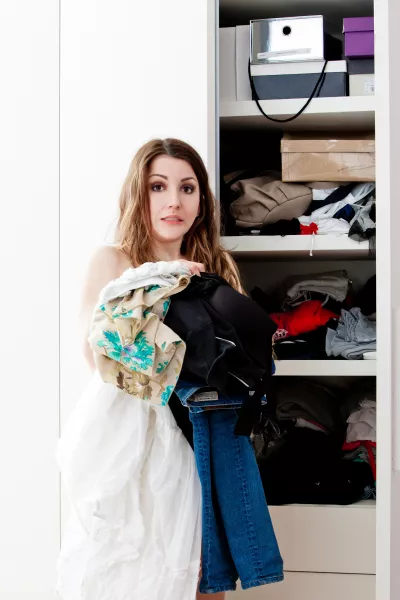Do you feel a wave of panic every time you peek inside your wardrobe and face a mountain of mess? Do you regularly fantasise about having a computerised closet like Cher from Clueless?
In a new survey of 2,000 women by plus-size brand Taking Shape, more than half (52 per cebt) said their wardrobes cause them anxiety, with the most common reasons for stress being cluttered clothing, garments that no longer fit, and trying to be sustainable or ethical in their shopping choices.

Fashion is meant to be fun, so if getting dressed has become a headache-inducing chore instead of an easy, breezy task, it’s time to do something about it.
These home organisation experts run down the seven steps to take to get your closet under control.
1. Prepare
If you rush into a wardrobe clear-out or do it on a whim, you might end up causing yourself even more stress. “Set aside some time and space to organise your wardrobe, doing it properly takes a few hours,” says Sue Spencer, founder of A Life More Organised.
“Before starting, think about how you’d like your wardrobe and bedroom to look. Browsing through magazines and Pinterest can inspire you.”
Lizzie Grant, founder of Declutter on Demand recommends writing down why you want to do it: “Perhaps you just want to end up with a wardrobe of clothes you love and feel good in. Or you may want to make putting away your laundry easier so it doesn’t just lie in piles around your home.
“Whatever your reason, keeping what you want to achieve at the forefront of your mind will keep you focused and motivated.”
2. Gather your garments

Now you can get to work on whittling down your wardrobe.
“Put all your clothes in one place – I like to put everything on the bed,” says Spencer. “Separate the different types of garment (jumpers, dresses, suits etc) into piles. This is often when people are shocked to see how many similar items they own and find clothes they’ve forgotten they had.”
3. Find your favourites

Grant recommends starting with a “small and unsentimental category (for example, socks) to ease yourself into decluttering” and laying all those items out.
“First pick out anything you know immediately you no longer want and put it in your donation or textile recycling bag,” she says. “Pick out your favourite items you really love or enjoy wearing and put them in your ‘keep’ pile.”
4. Sort through the rest

Next, look at what’s left in the category and decide whether each piece of clothing really deserves a place in your wardrobe. Spencer suggests using your three favourite garments in each category to guide you.
“Hold [each item] in your hands to decide whether it’s something you love – if it’s not obvious, compare it against your three top items to help you make the decision. If you don’t love the item, then put it in your discard pile, ready for the charity shop or eBay.”
5. Play the numbers game
“If you struggle to declutter based on what you love and use, then decide by giving yourself a limit on how many clothes in each category you keep,” says Grant. “If you are being honest with yourself, how many dresses or tops do you really need when your laundry gets done once a week?”
6. Storage solutions
So you’ve cast aside unwanted clothes and now you’re ready to reassemble your wardrobe in a streamlined manner. This is where storage solutions come in really handy.
“The two products that make the biggest difference are choosing hangers which work best for your wardrobe space and using drawer dividers to separate out different categories of clothes,” say Grant. “Buying storage solutions after you have decluttered – rather than before – will save you time and money as you can then see exactly what you need.”
7. Rolling not folding
While some organising pros favour specific folding techniques, Grant swears by the rolling method.
“Rolling clothes and storing in boxes or drawers is a really easy way to organise your wardrobe,” says Grant. “Fold tops or bottoms in half and then roll. Store rolled items of clothing next to each other and you will always be able to easily pick out what you want to wear.
“You may struggle to get other family members – or even yourself – to fold clothes and put them away, but rolling is so much easier!”







